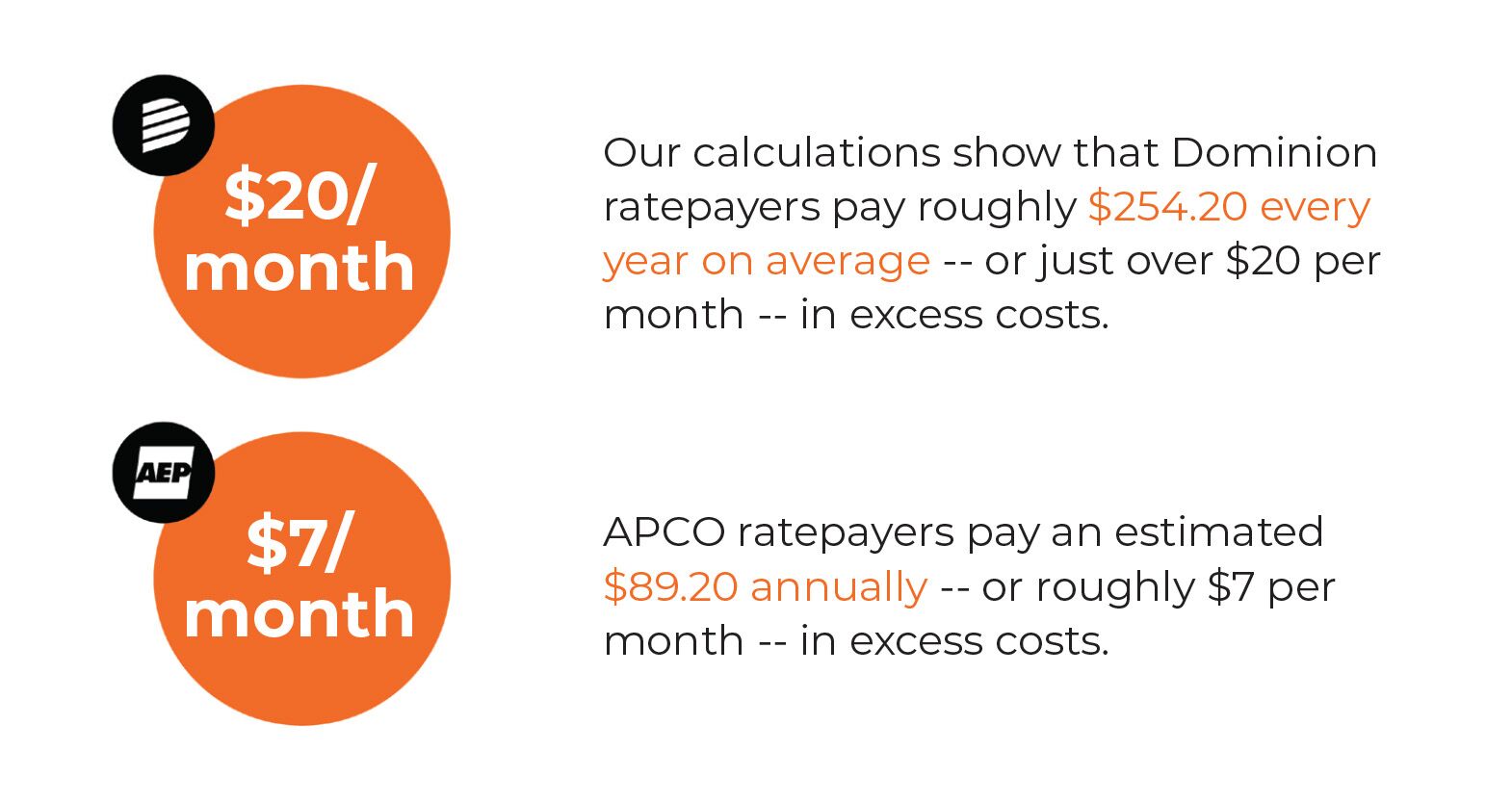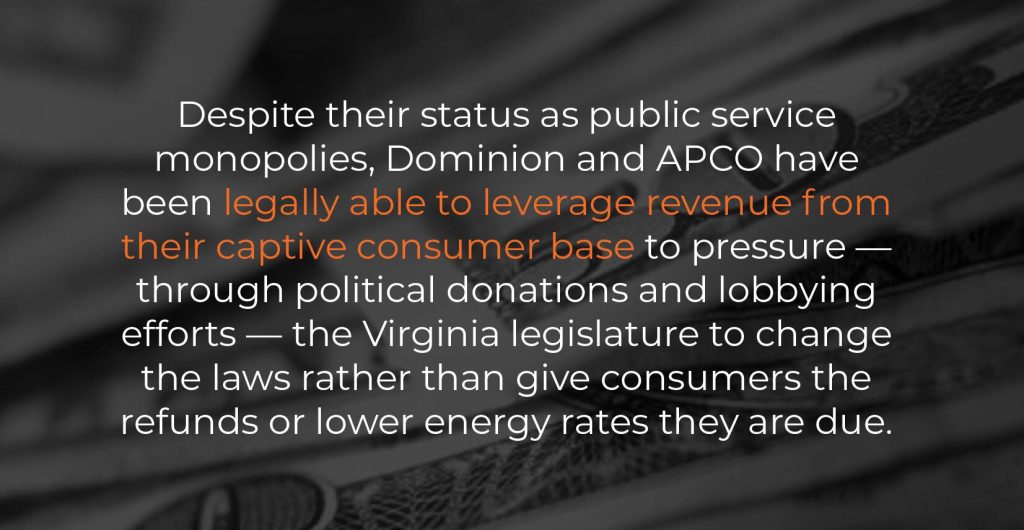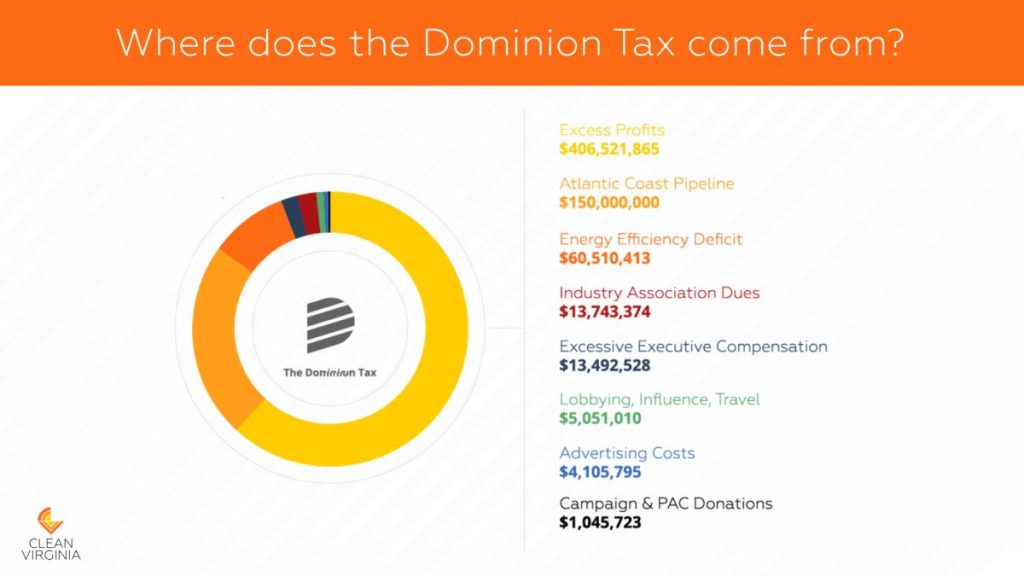‘Dominion Tax’ Is Costing Virginians Hundreds of Dollars on Electric Bills to Pay for Excess Corporate Profits, CEO Pay, Lobbying, Campaign Contributions, Unnecessary Projects
A groundbreaking new report from Clean Virginia has found that most Virginian ratepayers are paying an average of $250 more each year on their energy bills than they should. The calculation analyzes how Dominion and APCO — two utility monopolies that provide service to more than 8 in 10 Virginians — are charging their ratepayers not only for energy use and delivery but also to subsidize excess corporate profits, executive pay, lobbying, campaign contributions, and more.
The report proposes how legislators and Virginia government agencies can eliminate this so-called “Dominion Tax” and put hundreds of dollars back in the pockets of Virginia consumers and businesses through a reform agenda to confront Dominion’s outsized influence in Richmond.

Key Findings
- Energy bills in Virginia have stopped reflecting the fundamental principle that ratepayers should only pay for the underlying cost of their energy and its delivery.
- Ratepayers in Dominion and Appalachian Power’s (APCO) service territory are paying over $700 million a year toward excess profits and excess costs with limited — and often zero — proven benefit
to ratepayers. - These excess costs amount to an average of $254.20 annually for Dominion ratepayers and an average of $89.20 annually for APCO ratepayers.
- Despite their status as public service monopolies, Dominion and APCO have been legally able to leverage revenue from their captive consumer base to pressure — through political donations
and lobbying efforts — the Virginia legislature to change the laws rather than give consumers the refunds or lower energy rates they are due. - Because renewables like solar are now cost-competitive with fossil fuels and energy efficiency saves ratepayers over the long run, there’s no reason utilities need oversized guaranteed rates of return to
lower energy bills and improve environmental outcomes. - To repeal the “Dominion Tax,” we must empower regulators to keep rates as low as possible, increase consumer choice, reduce the subsidization of influence activities, and end utility “pay-to-play” in Richmond.

Executive Summary
In this report, Clean Virginia examines why Virginians are paying higher energy bills than they should and, specifically, what portion of monthly bills are not directly related to the generation, production, or delivery of energy to Virginia’s consumers. We call this calculation of excess costs the Dominion Tax.
Dominion Energy Virginia (Dominion) and Appalachian Power Company (APCO) are the two largest utility monopolies in Virginia. More than 8 in 10 Virginians rely on these companies for their electricity, with Dominion and APCO providing energy for 67.5% and 14% of Virginia ratepayers, respectively. As public service utilities, they were granted monopolies by the state in their service areas in exchange for building the massive and complex infrastructure required to provide power in those regions, and to guarantee energy delivery to all ratepayers. As monopolies, they are free from the price-setting mechanisms of market competition. Because there are no market forces to drive down costs, determining the price Dominion and APCO charge for energy is the responsibility of the government, specifically the Virginia General Assembly and the State Corporation Commission (SCC).
Over the past two decades, the General Assembly has passed a series of new laws that have changed how electric utilities operate and the mechanism through which the SCC determines the “fair” market prices for electricity.3 The most significant change came in 2015 when the General Assembly froze rates at artificially high levels and curtailed normal oversight of how much Dominion and APCO are able to charge customers. These corporations lobbied successfully for two new laws in 2015 (SB 1349, the so-called “Rate Freeze Law”) and 2018 (SB 966, the Grid Transformation and Security Act) that suspended the normal biennial review of their rates, preventing the SCC from lowering rates or mandating ratepayer refunds in cases of overcharging. As a result of these two laws, Dominion has kept, on average, over $350 million each year since 2016 in over-earnings — money in excess of what the SCC determines as reasonable profit. Historically, the vast majority of this money would have been refunded to ratepayers. Dominion and APCO have seen consistent returns of approximately 13 – 14% and 11%, respectively and have kept rates high by funneling profits into high-earning capital projects, without having to demonstrate their value to ratepayers.
This report identifies how much Dominion and APCO’s policies and practices cost Virginian ratepayers above the normal cost of providing electricity, even after allowing these companies a traditionally reasonable rate of return as set by the SCC in a rate review case. These excess costs amount to an average of $254.20 annually for Dominion ratepayers and an average of $89.20 annually for APCO ratepayers. The excess costs to ratepayers come in many forms, but the following eight categories best establish the different measurable ways in which Dominion and APCO unnecessarily drive up costs for ratepayers:
- Excess profits beyond the normal, reasonable rate of return approved by the SCC
- Advertising costs
- Excessive executive compensation
- Lobbying, influence, and travel expenses
- The net cost of the Atlantic Coast Pipeline (Dominion only)
- Donations to elected officials and PACs
- Industry association dues
- Increased energy costs due to a lack of energy efficiency efforts.

We call these excess costs the Dominion Tax and the “APCO Tax” — the amount each consumer is forced to pay their utility monopoly in excess of the corporation’s reasonable allowed profit. These taxes are the result of an abuse of state-sanctioned market control and are enabled by outdated regulatory structure, insufficient campaign finance and ethics laws, and weak consumer protections. Over the past two decades, many legislators in the General Assembly have consistently supported legislative efforts by Dominion and APCO to create a permissive environment for these abuses.
This report concludes with Clean Virginia’s recommendations for legislative changes that will repeal the Dominion Tax and lower energy bills for all Virginians, as well as policy suggestions to help fix the legalized corruption that allows Dominion and APCO to effectively write their own rules in Virginia’s political system.
These recommendations include:
- Returning regular rate case review to its traditional, biennial schedule. Under current law, six years will lapse before Dominion’s base rates or financial records are reviewed (from 2015 to 2021). APCO’s rates will not be reviewed until 2020.
- Reforming the methodology through which monopoly utilities’ rates of return are calculated, including abolishing the use of “peer group analysis,” currently mandated by law. This form of analysis has been shown to inflate energy bills regardless of underlying energy prices, capital costs, or prevailing interest rates.
- Ending undue utility-monopoly influence over the state legislators, who, in Virginia’s system, are responsibly for regulating said utilities. This means capping utility lobbying spending, banning utility campaign contributions, and issuing refunds to ratepayers to compensate them for non-essential spending such as advertising and industry association dues.